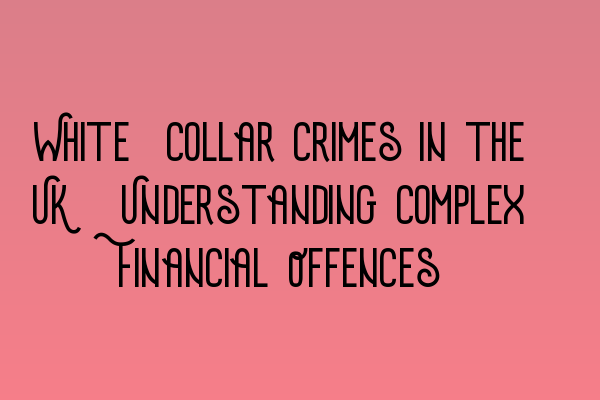White-Collar Crimes in the UK: Understanding Complex Financial Offences
In today’s increasingly interconnected and digitized world, white-collar crimes have become prevalent, posing significant challenges to law enforcement agencies and the legal system. With a rise in complex financial transactions, the United Kingdom has seen an increase in white-collar crimes, which are non-violent offenses typically committed by individuals or organizations for financial gain.
What are White-Collar Crimes?
White-collar crimes are financial offenses that involve deceit, fraud, or other unethical practices, typically committed by corporations, professionals, or individuals in positions of trust. These crimes often involve sophisticated methods and concealment techniques, making them difficult to detect and prosecute.
Some common examples of white-collar crimes include:
- Fraudulent schemes
- Embezzlement
- Money laundering
- Bribery
- Tax evasion
- Insider trading
These offenses can have devastating consequences not only for the individuals involved but also for the economy and society as a whole.
Investigation and Prosecution
Investigating and prosecuting white-collar crimes requires specialized knowledge and expertise in financial regulations, accounting practices, and forensic techniques. Law enforcement agencies often collaborate with financial experts and forensic accountants to gather evidence and build strong cases against the perpetrators.
Prosecuting white-collar crimes can be challenging due to the complex nature of these offenses. Gathering evidence, establishing a chain of custody, and proving intent beyond a reasonable doubt require meticulous attention to detail and a thorough understanding of financial transactions and regulations.
The Role of Solicitors in White-Collar Crime Cases
Solicitors play a crucial role in representing individuals or organizations involved in white-collar crime cases. They provide legal advice, assist in the investigation process, and ensure their clients’ rights are protected throughout the legal proceedings.
In white-collar crime cases, solicitors may handle various aspects, such as:
- Conducting legal research
- Gathering evidence
- Preparing legal documentation
- Negotiating plea bargains
- Presenting arguments in court
Having a skilled solicitor by your side can significantly impact the outcome of a white-collar crime case, as they can navigate the complexities of the legal system and ensure a robust defense.
Prevention and Compliance
Preventing white-collar crimes begins with promoting ethical business practices and ensuring compliance with relevant laws and regulations. Organizations can implement internal controls, conduct regular audits, and provide ethics training to employees to mitigate the risk of financial misconduct.
Consulting with legal experts who specialize in business regulations and ethical considerations, such as Business Regulations in the UK: A Comprehensive Overview and Ethical Considerations in UK Law: Upholding Professional Standards, can help businesses develop robust compliance programs.
Conclusion
As white-collar crimes continue to evolve and become more sophisticated, it is crucial for individuals and organizations to understand the complexities of these financial offenses. By being aware of the potential risks, seeking legal counsel when necessary, and maintaining ethical business practices, we can contribute to a safer and more transparent financial system.
For more information on legal topics, read our related articles:
- Demystifying the Solicitors Qualifying Examination Format
- LLC Formation Made Simple: Step-by-Step Guide for UK Entrepreneurs
- LLC Formation: A Step-by-Step Guide for UK Entrepreneurs
- Business Regulations in the UK: A Comprehensive Overview
- Ethical Considerations in UK Law: Upholding Professional Standards
